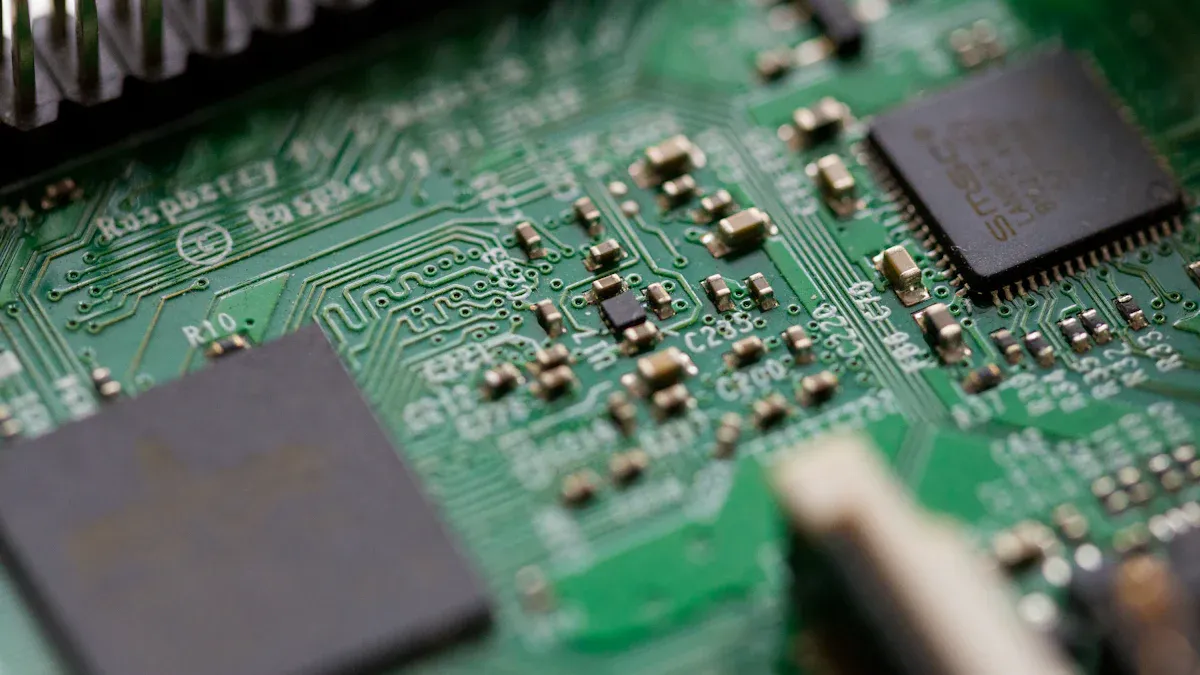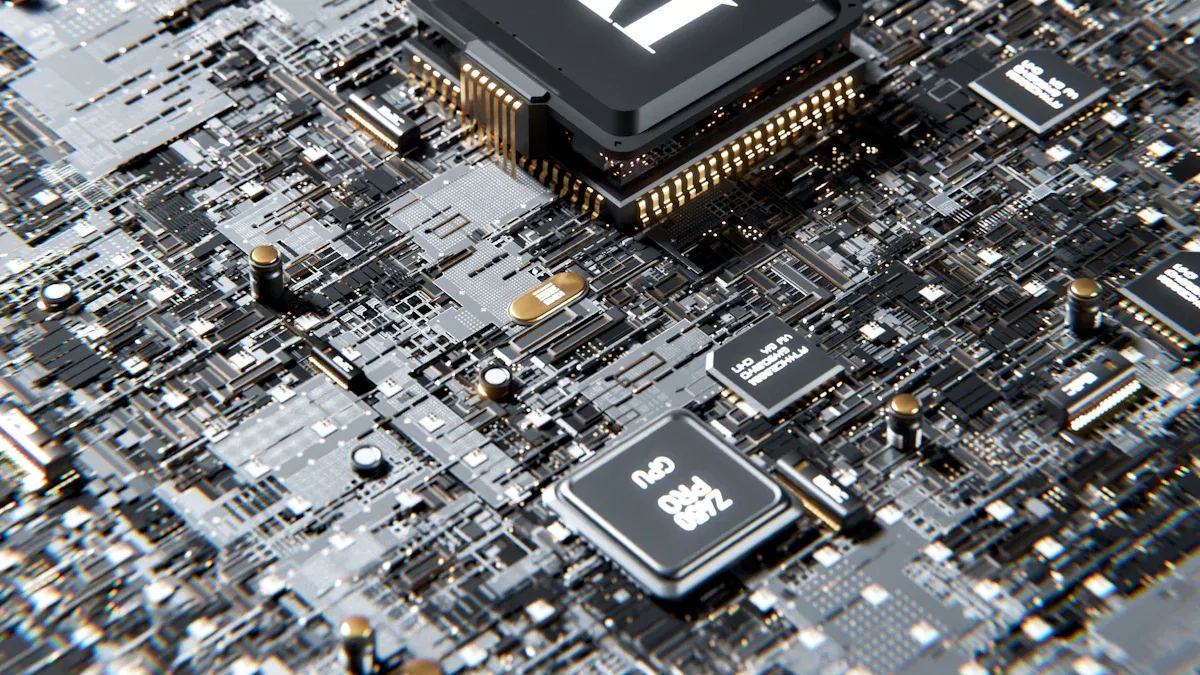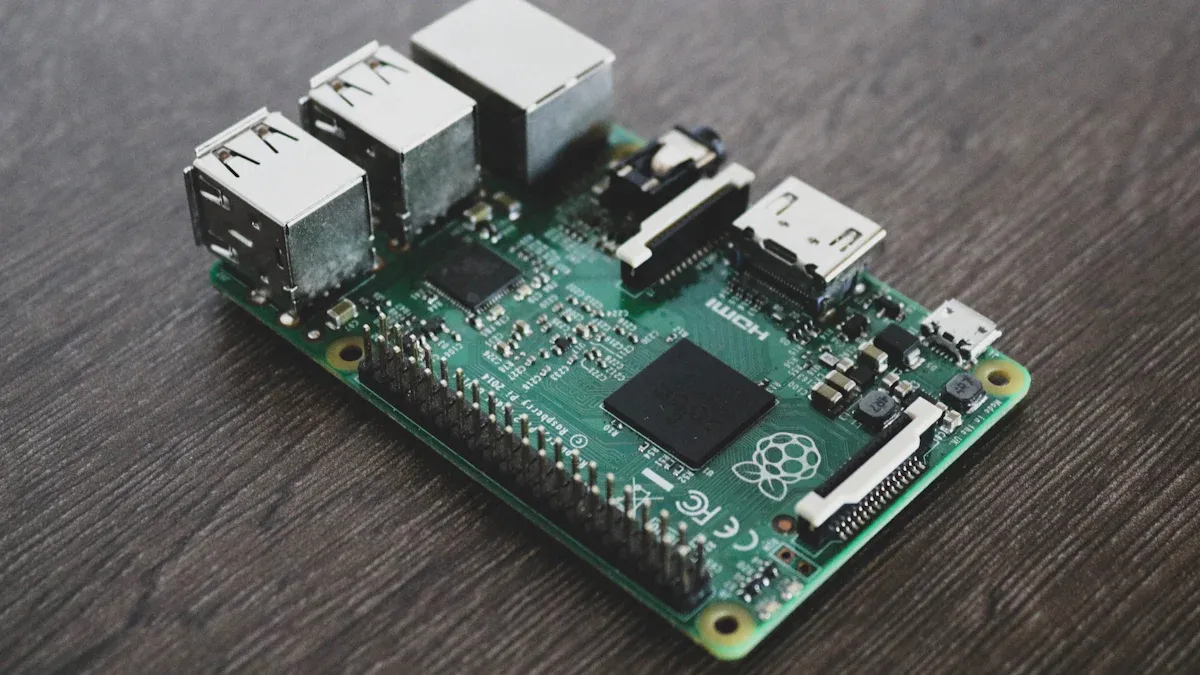What Is the STM32G070CBT6 Microcontroller and What Makes It Unique

The STM32G070CBT6 microcontroller uses an Arm Cortex-M0+ core that runs up to 64 MHz. This chip features many built-in tools and supports power-saving modes. Engineers often choose it for smart home devices, industrial control systems, and other efficient solutions. Its strong performance and low power needs make it a favorite for consumer, industrial, and IoT projects.
Many developers select the STM32G070CBT6 for its blend of high performance and energy efficiency in modern embedded systems.
Key Takeaways
The STM32G070CBT6 microcontroller offers strong performance with a 64 MHz Arm Cortex-M0+ core and uses very little power, making it ideal for battery-powered devices.
It supports many communication interfaces and has advanced features like a fast 12-bit ADC, multiple timers, and low power modes to save energy.
This chip works reliably in a wide temperature range from -40°C to 85°C, fitting well in smart homes, industrial machines, and outdoor IoT devices.
Developers benefit from rich development tools, community support, and flexible programming options including C, C++, and Python via PikaScript.
The STM32G070CBT6 is widely used in smart home, industrial, consumer electronics, and education sectors due to its balance of efficiency, features, and ease of use.
STM32G070CBT6 Overview

Core Specs
The STM32G070CBT6 microcontroller belongs to the STM32G0 series. It uses an Arm Cortex-M0+ core that runs at speeds up to 64 MHz. This core helps the device handle tasks quickly and efficiently. The microcontroller comes with 128 KB of Flash memory and 36 KB of SRAM. These memory sizes allow it to store programs and data for many embedded applications.
The device operates within a voltage range from 2.0 V to 3.6 V. It can work in temperatures from -40°C to +85°C. This wide range makes it suitable for both indoor and outdoor projects. The STM32G070CBT6 comes in a compact LQFP-48 package, which helps save space on circuit boards.
The STM32G0 series focuses on entry-level, cost-sensitive applications. It offers high efficiency and flexibility. The Cortex-M0+ core in this series is optimized for low power and cost, making it a good choice for projects that need to balance performance and budget. While the STM32G070CBT6 does not match the raw power of higher-end STM32 cores like Cortex-M3, M4, or M7, it stands out in its category for efficiency and value.
The STM32G070CBT6 can run at a minimum voltage of 2V, which helps it work well in battery-powered devices.
Key Features
The STM32G070CBT6 microcontroller includes many features that support a wide range of applications. It offers several low power modes, such as Sleep, Stop, and Standby. These modes help save energy when the device is not active. The microcontroller also has a direct VBAT input. This feature keeps the real-time clock (RTC) and backup registers running during power loss.
The device supports many communication interfaces. It has two I2C ports, four USARTs, and two SPI ports. These interfaces allow the microcontroller to connect with sensors, displays, and other devices. The 12-bit ADC can handle up to 16 external channels and supports fast conversion times. This makes it useful for reading analog signals from sensors.
A total of 11 timers are available, including advanced timers for motor control and general-purpose timers for other tasks. The microcontroller also includes a DMA controller, watchdog timers, and a calendar RTC with alarm and periodic wakeup features. These tools help developers build reliable and flexible systems.
The STM32G070CBT6 stands out for its energy efficiency. In run mode, it uses less than 100 µA per MHz. In stop mode with the RTC running, it draws only 3-8 µA. In standby mode, the current drops as low as 500 nA. This low power use makes the device ideal for battery-powered and energy-sensitive projects.
Details | |
|---|---|
Core | Arm 32-bit Cortex-M0+ CPU, up to 64 MHz |
Memory | 128 KB Flash, 36 KB SRAM (32 KB with hardware parity check) |
Low Power Modes | Sleep, Stop, Standby |
Power Management | Voltage: 2.0 V to 3.6 V; VBAT input for RTC and backup |
Communication | 2 I2C, 4 USARTs (with SPI, LIN, IrDA, ISO7816), 2 SPIs, I2S multiplexed |
ADC | 12-bit, up to 16 external channels, 0.4 µs conversion, hardware oversampling up to 16-bit |
Timers | 11 total: advanced motor control, general-purpose, basic, watchdogs, SysTick |
RTC | Calendar with alarm and periodic wakeup |
DMA Controller | 7-channel DMA with flexible mapping |
Operating Conditions | -40°C to +85°C; 2.0 V to 3.6 V |
Development Support | Serial Wire Debug (SWD) |
The STM32G070CBT6 uses an internal power distribution scheme. This design reduces the number of external power pins, saving board space and lowering the bill of materials cost. The microcontroller’s features and efficiency make it a strong choice for industrial, appliance, and IoT projects.
Unique Advantages
What Sets It Apart
The STM32G070CBT6 stands out in the world of microcontrollers because of its strong mix of features and reliability. Many engineers choose this chip for projects that need to work well in different environments. It can handle both very cold and very hot temperatures, from -40°C to 85°C. This wide range means it works in smart homes, factories, and even outdoor devices.
A key advantage comes from its rich set of built-in tools. The microcontroller includes advanced timers for precise control, a fast 12-bit ADC for accurate sensor readings, and several ways to connect to other devices, such as I²C, SPI, and USART. These features help it fit into many types of products, from smart thermostats to industrial machines.
Developers often pick this microcontroller because it keeps running smoothly even when conditions get tough.
The table below shows how the STM32G070CBT6 compares to similar microcontrollers in real-world use:
Feature/Aspect | Details/Performance |
|---|---|
Core | Arm Cortex-M0+ running up to 64 MHz |
Memory | 128 KB Flash, 36 KB SRAM |
Peripherals | PWM timers, ADCs, I²C, SPI, USART |
Voltage Range | 2.0 V to 3.6 V |
Operating Temperature | -40°C to 85°C |
Special Features | VBAT input for RTC backup, Memory Protection Unit, Dynamic power optimization |
Application Domains | Smart homes, industrial machines, consumer electronics, IoT devices |
Advantages Compared to Similar MCUs | Robust processing, wide voltage and temperature range, energy efficiency, strong peripheral set, reliable operation in harsh conditions |
Development Support | Comprehensive tools and documentation |
The STM32G070CBT6 also offers a special VBAT input. This feature keeps the real-time clock running even if the main power goes out. The chip’s memory protection unit helps keep data safe, which is important for security in connected devices.
Performance and Efficiency
Performance and energy efficiency make this microcontroller a top choice for many projects. The chip uses less than 100 microamps per megahertz when running. In stop mode, it draws only 3 to 8 microamps with the real-time clock still working. In standby mode, it uses as little as 500 nanoamps. These low numbers help batteries last much longer in portable devices.
The STM32G070CBT6 includes dynamic power optimization. This means it can adjust its power use based on what the device is doing. For example, it can save energy when waiting for a signal and then quickly wake up to process data. This feature is very useful in smart home sensors and IoT devices that need to run for months or years on a single battery.
Some of the main reasons engineers choose this microcontroller for high-performance and energy-saving projects include:
Reliable operation in both hot and cold environments
Advanced timers and ADCs for precise control and fast data collection
Multiple low-power modes to extend battery life
Easy connection to many types of sensors and displays
Strong support from development tools and documentation
Many smart home devices, such as thermostats and security systems, use this chip because it works well in extreme temperatures and saves energy.
The microcontroller’s fast ADC and high-accuracy timers help it respond quickly and accurately in real-time applications. These features make it a good fit for industrial machines, appliances, and consumer electronics like tablets and e-readers.
Applications

Use Cases
The STM32G070CBT6 microcontroller supports many practical uses in the real world. Developers often choose this chip for projects that need both power and efficiency. The microcontroller works well in devices that must run for long periods without much energy.
Smart home devices use this chip to control lights, thermostats, and security systems.
Industrial machines rely on it for motor control, sensor data collection, and safety monitoring.
Consumer electronics, such as e-readers and tablets, benefit from its low power use and fast response.
IoT sensors and gateways use the STM32G070CBT6 to collect and send data over networks.
A notable project that uses this microcontroller is PikaScript. PikaScript is a lightweight Python engine that runs on low-end microcontrollers. The official Pika-Pi-Zero board uses the STM32G070CBT6 to let users write Python code for hardware tasks. This project shows how the chip can handle scripting, GPIO, USART, ADC, and PWM functions with limited memory. The PikaScript project also provides open-source code and demos, making it easy for others to learn and build similar solutions.
Many developers choose the STM32G070CBT6 for projects that need reliable performance and flexible programming options.
Industries
Many industries use the STM32G070CBT6 microcontroller in their products. Its wide temperature range and strong feature set make it a good fit for different fields.
Industry | Example Applications |
|---|---|
Smart Home | Lighting, thermostats, security systems |
Industrial Automation | Motor control, sensor hubs, data loggers |
Consumer Electronics | E-readers, tablets, remote controls |
IoT | Wireless sensors, gateways, smart meters |
Education | Development boards, coding kits, STEM tools |
Smart home companies use this chip to build devices that work in many environments. Factories use it in machines that need to run safely and efficiently. The education sector also benefits, as students can learn coding and hardware skills using boards based on the STM32G070CBT6. The microcontroller’s flexibility and support for Python scripting help make it a popular choice across these industries.
Development Resources
Tools and IDEs
Developers can choose from several official tools and integrated development environments (IDEs) when working with the STM32G070CBT6. These tools help set up projects, write code, and program the microcontroller. The most popular options include:
STM32CubeMX: This tool helps configure the microcontroller and generate initialization code. It makes setting up clocks and peripherals easy.
STM32CubeIDE: This all-in-one IDE supports coding, debugging, and project management. It works well with STM32CubeMX.
STM32CubeProgrammer: This tool programs the microcontroller and manages firmware updates.
ST Edge AI Suite: This suite supports artificial intelligence projects on STM32 devices.
STM32 MCU Developer Zone: This online platform provides extra software tools and resources.
Tip: STM32CubeMX and STM32CubeIDE work together to make development faster and easier.
Community Support
A strong community helps developers solve problems and learn new skills. The official STMicroelectronics Community platform hosts many active forums. These forums cover topics like hardware, software, and troubleshooting for STM32 microcontrollers.
Subforum Category | Description / Focus Area |
|---|---|
STM32 MCUs Products | Discussions on STM32 microcontroller products |
STM32 MCUs Boards and hardware tools | Hardware tools and development boards |
STM32 MCUs Software development tools | Software tools and IDEs |
STM32 MCUs Embedded software | Embedded software topics |
STM32 MCUs TouchGFX and GUI | GUI development and TouchGFX framework |
STM32 MCUs Motor control | Motor control applications and support |
STM32 MCUs Security | Security features and implementations |
STM32 MCUs Wireless | Wireless communication topics |
Others: STM32 MCUs related | Other STM32 MCU related discussions |
Developers often face challenges such as configuring flash memory, handling UART interrupts, and managing pin setups. The community shares advice on these topics and helps newcomers avoid common mistakes. Many users recommend reading the reference manual and using STM32CubeMX for hardware setup. Books like "Mastering STM32" and step-by-step tutorials also help beginners get started.
Document Type | Document ID | Description |
|---|---|---|
Datasheet | DS12766 | Details for STM32G070CBT6, including memory and peripherals |
Reference Manual | RM0444 | Covers STM32G0x1 MCUs |
Reference Manual | RM0454 | Covers STM32G0x0 MCUs |
Programming Manual | PM0223 | Programming guide for Cortex-M0+ MCUs |
Errata Sheet | ES0468 | Device errata for related STM32G070 devices |
User Manual | UM3083 | Self-test library user guide for STM32G0 Series |
Note: Reading the datasheet and reference manuals helps developers understand the microcontroller’s features and avoid common errors.
The STM32G070CBT6 offers strong performance, low power use, and a wide range of features. Engineers find it reliable for many embedded projects. Its flexible design fits smart homes, industry, and IoT devices. Developers can use helpful tools and join a large support community.
Many teams choose this microcontroller for new designs because it stands out in both value and support.
FAQ
What programming languages can developers use with the STM32G070CBT6?
Developers often use C or C++ for STM32G070CBT6 projects. Some tools, like PikaScript, allow Python scripting. Most official libraries and examples use C.
Does the STM32G070CBT6 support USB connectivity?
The STM32G070CBT6 does not include a built-in USB peripheral. Developers who need USB should consider other STM32 models with USB support.
How much current does the STM32G070CBT6 use in low-power modes?
In standby mode, the microcontroller uses as little as 500 nanoamps. In stop mode with the RTC running, it draws about 3 to 8 microamps.
Can beginners start learning embedded systems with this microcontroller?
Yes. Many starter kits and tutorials use the STM32G070CBT6. The community and official resources help beginners learn step by step.
See Also
Key Features That Differentiate ON Semiconductor Chips
Best Microcontrollers Featuring Ethernet And Camera For 2025
Selecting The Ideal Low-Power MCU For Your Project
